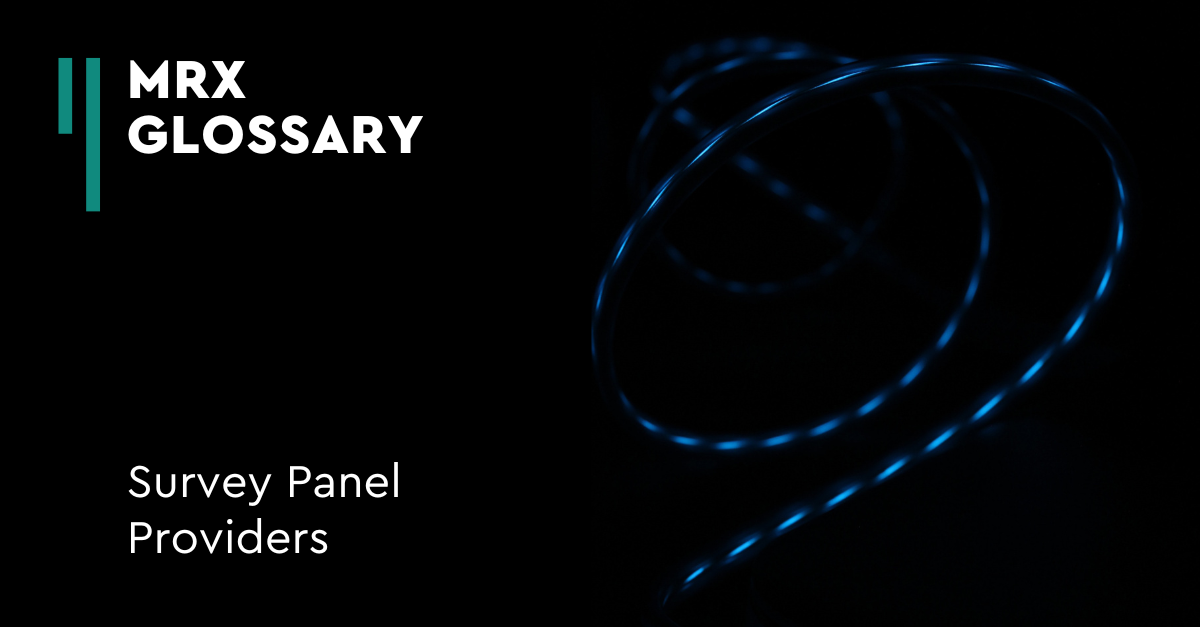This blog post explores survey research panel providers - including what they are, why they're important, how to fit them into your market research budget, and how to ensure high-quality data from your survey panel provider.
Market research allows brands to get insights into their consumers and marketing efforts, but first, brands must reach out to respondents to bring the consumer research process to life. Whether looking for consumer reactions to a new product, running a segmentation, or searching for general consumer insights in a U&A (usage and attitude) study, panel providers make it simple to tap a select group of consumers. Survey panel companies are created with this need in mind — serving as a bridge for brands that want to speak to mass consumers directly, quickly, and easily.
Table of Contents:
- What is a research panel?
- Why is panel research important?
- When to use a research panel?
- Building your own research panel
- Partnering with a survey panel provider
- Three examples of panel provider companies to consider
- Panel research with quantilope
What is a research panel?
An online market research panel is a massive online panel of consumers that have signed up and are willing to regularly take part in survey research (for either quantitative surveys or online focus groups). These panels keep a pulse on who their panel members (i.e. respondents or panelists) are demographically, behaviorally, etc., meaning they can tailor who a survey is sent to - giving you confidence that you're collecting data from the right people. As one would assume, targeting can make the fielding process much more efficient. In exchange for their time, respondents receive incentives in some form of payment (cash, reward points, gift cards, etc.). The cost of these incentives typically gets passed directly on to the brand, making up the majority of a research panel’s cost.
Why is panel research important?
Likely, the package you see on the shelf in a grocery store is not the first version that a brand proposed; rather, it was finely polished through rounds of consumer research before ever hitting the market. If brands are not optimizing their products prior to launch through research solutions, it’s very likely they are leaving revenue on the table. However, finding the right consumers to take part in your research is just as important as the research itself.
Panels are the most cost-efficient and effective way for most brands to reach the right target audiences. In fact, the speed and cost-effectiveness of modern research panels no longer require brands to make pivotal decisions based on gut feel. Speaking specifically about online research panels, without them, many brands would not be able to hear from qualified consumers to help them address their core research needs. The most beautifully written online survey questionnaire can only be so powerful without the right people to take it.
Benefits of panel research:
- Cost-effective:
For access to their panel and to cover incentives offered to respondents, panel companies will require you to set aside some of your market research budget. There are several factors that determine the overall cost of a study, which should all be factors when deciding what research your team should execute. The typical factors include: incidence rate (IR), the average length of the survey (LOI), and the number of total survey completes you’re aiming to achieve. Panel providers will also help determine the feasibility of the audience you are hoping to reach, to make sure it’s a study that’s worth attempting in the first place.
- Fast insights:
As mentioned above, the incidence rate is how easy or difficult is it to reach a certain target group of panelists. If you are looking to test an advertisement among a very general audience for your study, such as men and women between the ages of 18-65, the incidence rate for this group will be very high - and subsequently, low in cost and quick to achieve.
Inversely, if you are looking to test consumer satisfaction of a product among healthcare workers that: typically work overtime, are decision-makers in their households, and only live in certain regions of the US, higher costs will be incurred as this will be a much more difficult target audience to reach and might take longer to capture. However, panel research providers are the experts in sourcing the right audiences for the right study, through a large database of panelists. Thus, even for tough markets to reach, panel research companies will be the quickest avenue of doing so.
- Capture better responses:
Panel providers put relentless effort into preserving the quality of the data brands receive when using their online panel service. However, it’s always a good idea for the brand team closest to the study to also perform quality control checks of the data. Quality control might include reviewing open-end data for answer quality, checking if respondents took the survey too quickly (known as ‘speeders’), or seeing if people selected the same answer at every scaled question or selected every answer option at several questions (these respondents are known as ‘straight-liners’). Beyond these checks, it’s also beneficial to have questions within the body of the survey to make sure respondents are paying close attention — such as asking them to select a specified image or doing basic arithmetic in an open-end field. Your market research data is what drives your business decisions, so it’s crucial to feel confident about its quality and panel providers can help achieve this.
Back to Table of Contents
When to use a research panel?
Knowing the benefits of using a research panel, how do you know when it's a good opportunity to use one? Below are some of the best cases to leverage an online survey panel provider:
- Frequency:
If you have a study that runs often (say, a brand tracker), you'll probably want to make sure you are capturing responses from unique individuals each time for an unbiased read on your brand. Panelists are able to identify past participants of your study within a given time frame and avoid sending the new survey out to those same respondents. - Detailed responses:
When looking for very detailed responses - say, through several open-ended questions -panels are the way to go to ensure your participants have been vetted as high-quality participants who are dedicated and interested in taking research studies. The alternative would be sending the survey out to the masses of internet users and likely getting a lot of poor-quality responses back that you'll have to comb through and clean out in the data cleaning process. - Subject matter expertise:
As alluded to above, with the specific healthcare audience example, panels are great to use when you are looking for respondents with certain subject matter expertise. You don't want to waste your time and money sending a survey out to respondents who don't meet the qualifications you're looking for. Panels keep detailed (though anonymous) information on respondents' ages, occupations, level of income, etc. to help you find the right audience with the right credentials. - Large and varied audience:
On the flip side to the section above, panels are also great for reaching large, broad audiences. In addition to having targetable audiences with unique subject matter expertise, panels also have a large database of general population (i.e. gen pop) sample that qualify for just about any study but are still vetted for quality. A gen pop sample tends to include quotas representative of the population surveyed, so that you're still achieving varied points of view in terms of age, gender, region, and ethnicity.
Back to Table of Contents
Building your own research panel
While panel providers have many benefits, some companies may opt to build their own proprietary sample. This sample would be a group of respondents your business has identified as qualified research participants. Below are a few key steps in building your own research panel:
- Determine your source
Where do you want to gather your group of panelists from? Is it from your own company's email list? Newsletter subscribers? Social media followers? A combination of all three? Figure out where these respondents are going to come from and then make sure that source is able to update as new consumers qualify (those who make a first-time purchase, follow your brand, subscribe to your newsletter, etc.)
If you don't have your own reliable sources of panelists, there are many third-party vendors that can help - such as affiliate networks, purchased lists, and more. - Gather key information
Upon identifying your group of panelists, it's time to start gathering some key information about them so you can easily target the right consumers for future surveys. Start broad, with just capturing a respondent's name, age, and email perhaps. Once you start to build up your panel with this basic information, you can begin to get more specific in terms of what those panelists do for an occupation, where they live, how much they earn a year, etc. - Engage with your panel
Qualified panelists are valuable, and should be treated as such. Make sure to send a welcome email when a respondent joins your panel, and send important updates from time to time. Your panelists should feel they are part of a community and should hear from you more often than just receiving surveys to take.
Back to Table of Contents
Partnering with a survey panel provider
If you decide building your own panel isn't right for you, and you'd prefer to partner with a survey panel provider for the benefits mentioned above, here are a few things to keep in mind:
- Survey panel rate cards
Panel partners will often work with you to determine a set rate card, depending on certain criteria such as LOI and IR. Based on how those metrics fall out for your survey, panel providers will reference the rate associated with those thresholds and charge you accordingly per respondent - this is often referred to as 'cost per interview', or, CPI for short.
It's wise to set up a rate card in advance of your partnership so there are no surprise costs or discrepancies in pricing later on. - Survey panel areas of expertise
Some survey panels are experts in certain areas - some might be best at reaching gen pop sample, others excel in niche samples, and some might focus on a certain industry such as healthcare. Search for a provider that is an expert in your area, or has experience reaching some of the target groups you're considering reaching out to. - Survey panel relationship
Beyond the business side of the relationship (in terms of cost and area of expertise), make sure your panel provider is one that you can easily contact when needed, has working hours that jive with your business, and is personable enough to be dealing with on a frequent basis. The last thing you want is a panel provider that you can't reach when you need to.
Back to Table of Contents
Three examples of panel provider companies to consider
Below are three examples of panel providers that can connect the right audience to your insights study, depending on your unique sampling needs.
DISQO
Founded in 2015, DISQO's extensive panel provides access to a wide range of consumers, allowing you to precisely target certain demographics or behavior profiles. Their panel is made up of a direct US audience, all who have fully-consented to providing feedback - leading to genuine responses from real consumers. DISQO guarantees data validation and fraud detection on each of their studies so you're left only with data you can trust.
Dynata
Dynata is an international panel provider with nearly 70 million opted-in consumers and business professionals, offering a diverse and representative panel of respondents across the globe. Dynata's panel is a pre-vetted and verified first-party source. They can access hard-to-reach audiences as well as general population respondents. Built within their platform is an anti-fraud technology solution which uses machine learning to ensure high quality.
User Interviews
User Interviews is a platform connecting qualitative researchers with participants for their user experience studies. With the ability to target over 4 million respondents with specific job titles, skills, behaviors, product usage, and more, User Interviews gets you the right people for your qualitative study - and quickly. They claim to have just a 1 hour median reach time to the first participant match, and researchers only pay for successfully completed sessions (not for no-shows or sessions that didn’t work out.)
Back to Table of Contents
Panel research with quantilope
No matter which type of study you’re running or what methodology you’re using, quantilope has trusted relationships with many different panel providers to reach the right group of people for your unique study. Whether you'd prefer to leverage the quantilope customer success team to lead this step of the research process, or use the platform’s panel management feature to own this step yourself, quantilope provides you with the option to do what works best for your business.
Along with quantilope’s panel management, the platform includes several other features that speed up the time to insights - such as copy/pasting a study or leveraging a variety of programmed survey templates. With these tools, and in working closely with quantilope’s customer success team through comment tagging, brands easily close the loop between them and their consumers, never making decisions based on gut feel. With quantilope, expect a quick and seamless panel process, in-depth consumer insights you can slice and dice in any way, and a live insights dashboard - all made possible through the power of automation.
To learn more about how you can reach panelists with quantilope, get in touch below:


